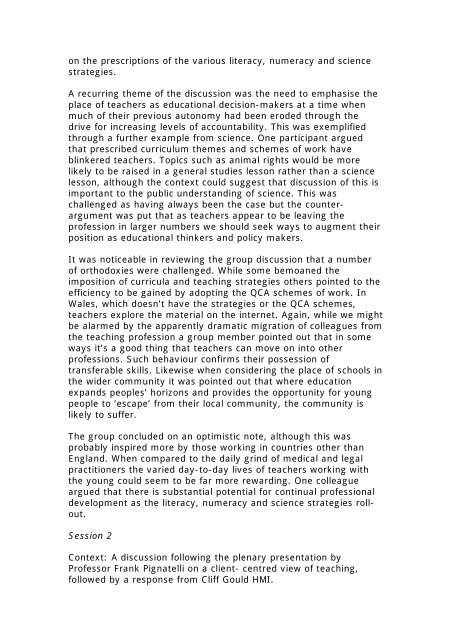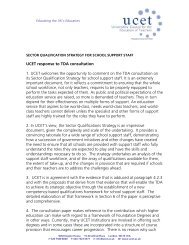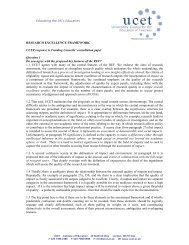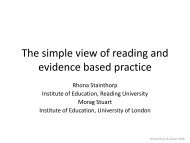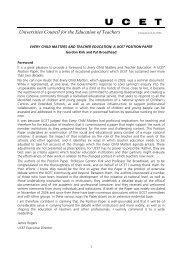The School Curriculum Ten Years Hence - UCET: Universities ...
The School Curriculum Ten Years Hence - UCET: Universities ...
The School Curriculum Ten Years Hence - UCET: Universities ...
Create successful ePaper yourself
Turn your PDF publications into a flip-book with our unique Google optimized e-Paper software.
on the prescriptions of the various literacy, numeracy and science<br />
strategies.<br />
A recurring theme of the discussion was the need to emphasise the<br />
place of teachers as educational decision-makers at a time when<br />
much of their previous autonomy had been eroded through the<br />
drive for increasing levels of accountability. This was exemplified<br />
through a further example from science. One participant argued<br />
that prescribed curriculum themes and schemes of work have<br />
blinkered teachers. Topics such as animal rights would be more<br />
likely to be raised in a general studies lesson rather than a science<br />
lesson, although the context could suggest that discussion of this is<br />
important to the public understanding of science. This was<br />
challenged as having always been the case but the counterargument<br />
was put that as teachers appear to be leaving the<br />
profession in larger numbers we should seek ways to augment their<br />
position as educational thinkers and policy makers.<br />
It was noticeable in reviewing the group discussion that a number<br />
of orthodoxies were challenged. While some bemoaned the<br />
imposition of curricula and teaching strategies others pointed to the<br />
efficiency to be gained by adopting the QCA schemes of work. In<br />
Wales, which doesn’t have the strategies or the QCA schemes,<br />
teachers explore the material on the internet. Again, while we might<br />
be alarmed by the apparently dramatic migration of colleagues from<br />
the teaching profession a group member pointed out that in some<br />
ways it’s a good thing that teachers can move on into other<br />
professions. Such behaviour confirms their possession of<br />
transferable skills. Likewise when considering the place of schools in<br />
the wider community it was pointed out that where education<br />
expands peoples’ horizons and provides the opportunity for young<br />
people to ‘escape’ from their local community, the community is<br />
likely to suffer.<br />
<strong>The</strong> group concluded on an optimistic note, although this was<br />
probably inspired more by those working in countries other than<br />
England. When compared to the daily grind of medical and legal<br />
practitioners the varied day-to-day lives of teachers working with<br />
the young could seem to be far more rewarding. One colleague<br />
argued that there is substantial potential for continual professional<br />
development as the literacy, numeracy and science strategies rollout.<br />
Session 2<br />
Context: A discussion following the plenary presentation by<br />
Professor Frank Pignatelli on a client- centred view of teaching,<br />
followed by a response from Cliff Gould HMI.


